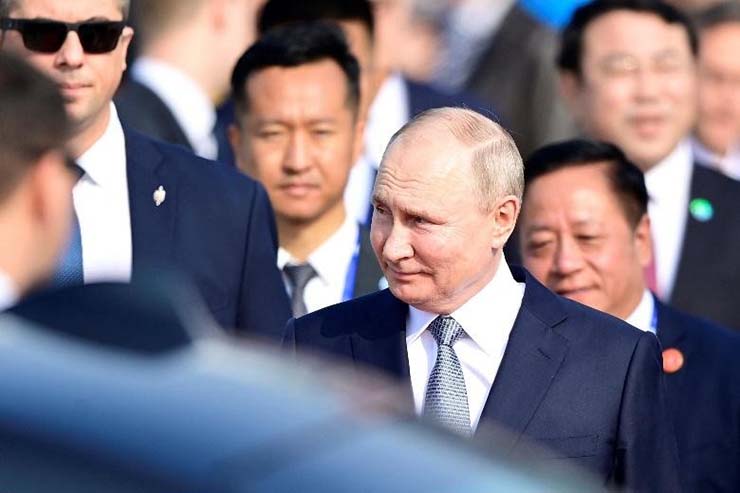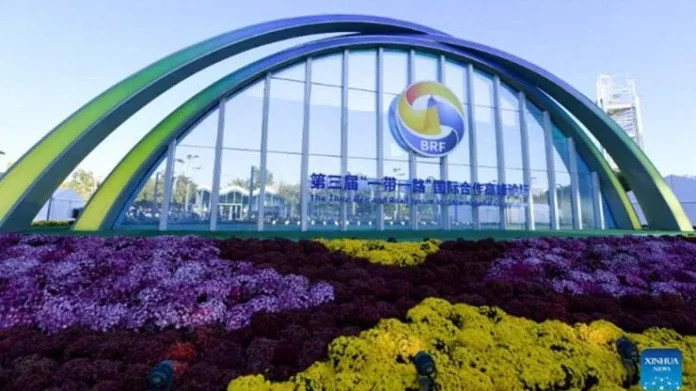The BRI Forum: As the representatives of various countries reached Beijing to attend the 3rd Belt & Road Initiative (BRI) forum on October 17-18, 2023, China was desperately looking to consolidate its marquee project. It is President Xi’s pet project and his personal indulgence has given the push as soon as he took over the presidency in 2013. The BRI envisaged linking China with Europe through Central Asia by land and through the Gulf by sea. President Xi has plans to turn the balance of influence in China’s favour and the project served as a perfect alibi for it.
The initiative was well cloaked in a web of smart pitches for infrastructure development combining necessary financial assistance as a highly tempting package. The World Bank in a May 2018 report on ‘Opportunities and Risks of BRI’ had termed it as having ‘Tremendous Size & Scope’. The BRI economies accounted for one-third of global GDP and trade, and close to two-thirds of the world population. BRI projects included railway lines, highways, expressways, ports, airports, housing societies, tourism development and everything backed by the monetary muscles from Chinese financial institutions.
The BRI economies accounted for one-third of global GDP and trade, and close to two-thirds of the world population. BRI projects included railway lines, highways, expressways, ports, airports, housing societies, tourism development and everything backed by the monetary muscles from Chinese financial institutions. At face value, BRI appears a sincere endeavour for global good but its hidden aspect is the lack of honesty of intent
BRI saw the Chinese romanticising this push model of infrastructure delivery across the globe. China’s mouthpiece People’s Daily in January 2023 reported that the initiative has reached the staggering strength of 151 countries and 32 international organisations with more than 200 BRI cooperation agreements signed to date. By any means a stunning achievement by China and merits among a few unbelievable things done by this country. The initial ‘success’ of increasing acceptability was trumpeted by Chinese media as a landmark achievement for President Xi. At face value, BRI did appear a sincere endeavour for global good, but the missing part was the honesty of intent.

Crashing Hopes
China carries widespread question marks on its endeavour and its intents. There has been no dearth of instances where Chinese initiatives have fallen on the wrong side of global acceptability norms. China challenged the Western developmental model with its own eye-catching infrastructure build-up, but it ended up forcefully displacing millions from major cities and the construction sector going bankrupt; it tom-tommed the prowess of its tech achievements and soon its mega-companies were banned globally from rolling out 5G infrastructure on the fears of tech-espionage; accomplishments of China’s scientific R&D was muddled with the spread of global pandemic originating from Wuhan Institute of Virology.
The fine prints of BRI projects had provisions for construction materials, labours and technology from China only. It was also to be undertaken only by Chinese enterprises. So, a major part of the investment on paper by China was routed back to the mainland to benefit its own economy, while the burden of repaying interest and loan were left on the recipients. How smart that Chinese companies were getting billions of dollars’ worth of contracts from foreign shores, pumping up their balance sheets without having to compete on any bidding, without having to prove their technology and without having to hold any liability with the local governments. Interestingly, the whitepaper on BRI published in September 2023 by the State Council Information Office of China hints at accusations of BRI exporting China’s climate liabilities by building coal-fired power plants overseas, by adding the word ‘Green’ ahead of its decade-old Silk Route initiative.
Interestingly, the whitepaper on BRI published in September 2023 by the State Council Information Office of China hints at accusations of BRI exporting China’s climate liabilities by building coal-fired power plants overseas, by adding the word ‘Green’ ahead of its decade-old Silk Route initiative
Countries have failed to adequately scrutinise the Chinese investment parameters and explain to their people why their economies have slid into a debt trap. Sri Lanka in its history has gone through the worst economic meltdown, a large chunk was attributed to Chinese wanton investments that added a burden to service huge loans. The Gwadar port in south Pakistan, after promising massive economic benefits, resulted in sunk expectations when cargo handling continued below par. Similar was the fortune of Pokhara International Airport in Nepal, where only one international flight has landed to date that too a chartered flight carrying Chinese athletes.

Desperation
The BRI was labelled as a pure business module for profit with investments having no element of social welfare, education or community upliftment component. Many countries, which China initially claimed to be part of BRI, clarified they have just approved the concept in principle but have not given any approval for the project. Britain once showed interest but never joined, and Italy wants to end the BRI agreements with China as soon as possible. Still, there are countries, which have already burnt their hands with BRI, want an exit model and limit their exposure in the immediate term. China is also wary of poor returns on BRI investments, neither the companies who have taken huge loans are showing commensurate profit nor the interest on loans is easily forthcoming.
The just concluded BRI summit has a contrasting narrative from what Chinese media would want the world to believe. They celebrated participation from over 90 countries but the fact is very few heads of state actually landed in Beijing with a majority of countries being represented by lower ranked ministers. The highest European leader to attend was the Hungarian President Orban and that tells the story. The Chinese built euphoria around the BRI forum to showcase great enthusiasm for it, but the fact is that many participants were worried and wanted to understand if the investments already planned in their country could be reworked, better aligning with global norms and improved terms of financial prudence.
Sri Lanka has gone through the worst economic meltdown, a large chunk was attributed to Chinese wanton investments that added a burden to service huge loans. The Gwadar port in Pakistan resulted in sunk expectations when cargo handling continued below par. Similar was the fortune of Pokhara International Airport in Nepal, where only one international flight has landed to date that too a chartered flight carrying Chinese athletes
It’s a whole circle that the BRI is fast completing, wherein the initiation was as euphoric as the sagging hopes it has now drowsed into. A decade gone by has exposed the hollowness of this venture. In the meantime, much-balanced alternatives have been created in the form of the Global Gateway programme, the Partnership for Global Infrastructure and Investment, and the India-Middle East-Europe Economic Corridor.
The lessons are there for many to learn; for those who just jumped in the melee – that there are no free lunches; for those who understood the plot and refrained from BRI for a variety of reasons including territorial concerns like India – that national concerns must always be prioritised, it may draw initial cost but it also ensures best long-term returns; and of course the lesson for China – you just cannot fool all the persons all the time! Surely China is not in a habit of comprehending such lessons but very soon the poor economics of BRI, the scandalous approach of its enterprises and the global retort over President Xi’s marquee project will dawn on it.
-The writer, experienced in security and geopolitics, contributes to national publications and newspapers. His articles can be accessed on the popular blog site newsanalytics.co.in, focusing on geo-strategic affairs.
-The writer has varied experience in the security paradigm and is a keen follower of global geopolitics. His work has been regularly featured in national publications. Visit newsanalytics.in to access more articles from the author. The views expressed are of the writer and do not necessarily reflect the views of Raksha Anirveda





